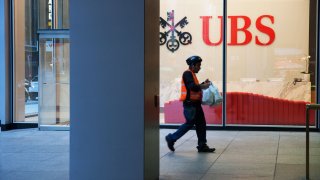
- The Swiss bank posted net profit of $1.35 billion for the fourth quarter, down from $1.64 billion a year earlier and also lower than the $2.28 billion reported the previous quarter.
- The bank's bottom line was hit by an increase of $740 million in litigation provisions for a French cross-border tax case.
LONDON — UBS on Tuesday reported a decline in quarterly profit, but beat analysts' expectations. The Swiss bank also set ambitious new profitability targets as part of a strategic update.
UBS posted net profit attributable to shareholders of $1.35 billion for the fourth quarter, down from $1.64 billion a year earlier and also lower than the $2.28 billion reported in the previous quarter.
Get Southern California news, weather forecasts and entertainment stories to your inbox. Sign up for NBC LA newsletters.
Analysts had forecast UBS to post net income attributable to shareholders of $863 million, according to the consensus published by the bank.
"The fourth quarter was a very good ending to a record year, the best year in 15 years, both from a pre-tax and a post-tax perspective," CEO Ralph Hamers told CNBC on Tuesday.
"The markets business held up really well with an operating income of 11% increase year-on-year, we saw net new money in the asset manager at $16 billion and we saw $27 billion of fee-generating assets coming in in the wealth manager," he said.
Money Report
The quarterly figures take the bank's full-year profit to $7.46 billion, above a company-compiled consensus of $6.98 billion and 14% higher than the previous year.
French money-laundering case
However, UBS' bottom line was hit by an increase of $740 million in litigation provisions for a French cross-border tax case. In late December, the bank filed an appeal with France's Supreme Court against a decision by a Paris appeals court to uphold a money laundering conviction, although with a reduced penalty.
Hamers said the bank was still assessing how best to approach the ongoing appeal against the ruling.
"Given the fact that you have another verdict here, we also looked at the overall case, whether we needed to change the provision that we already had," he told CNBC.
"Our best estimate at this moment in time, in terms of what could be payable at a certain moment in time, is 1.1 billion euro [$1.24 billion], and therefore we had to increase our provisioning by another 650 million euros, which is $740 million."
Here are other highlights for the third quarter:
- CET 1 ratio, a measure of bank solvency, reached 15.0% versus 14.9% in the previous three months.
- Operating income came in at $8.73 billion versus $9.1 billion in the previous quarter.
- Return on equity, a measure of financial performance, stood at 8.9% from 15.3% in the third quarter of 2021.
New targets
"We are aiming to create sustainable value through the cycle. Reflecting our improved operating performance over the last two years, we have updated our financial targets, while our capital guidance remains unchanged," the bank said in a statement accompanying the results.
In its first major strategic update since Hamers took the reins in Nov. 2020, UBS said it will aim for $6 trillion in invested assets across its global wealth management, asset management and personal and corporate banking divisions.
Meanwhile, the bank set the target range for its return on CET1 capital at 15-18% and cost-to-income ratio at 70-73%. The bank will also aim for 10-15% growth in profit before tax at its wealth management business.
"Our new aspirations, targets and goals will position us to live up to our purpose, better serve clients, deploy technology in differentiated and impactful ways, and open our ecosystem for new and existing clients," CEO Ralph Hamers added in a statement.
UBS proposed a dividend to shareholders of 50 cents per share for 2021, rising from 37 cents in 2020, and aims to buy back $5 billion worth of its own shares in 2022. Buybacks offer a way for firms to return cash to shareholders — along with dividends — and usually coincide with a company's stock pushing higher as shares get scarcer.






